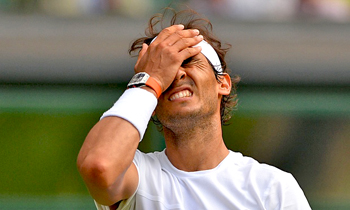Wimbledon/England, Jul 3: After having reached the final here in five consecutive appearances in the last decade, Rafael Nadal suffered his fourth consecutive loss at Wimbledon to a player ranked outside the top 100.
 It begs the question: Is Nadal done on grass?
It begs the question: Is Nadal done on grass?
"I cannot explain my relationship with the grass," a dejected-looking Nadal said Thursday after losing to 102nd-ranked qualifier Dustin Brown of Germany 7-5, 3-6, 6-4, 6-4. "The past couple of years I didn't have the best relationship possible with it. At the end of the day today, I lost."
Nadal is 5-4 at Wimbledon since 2011, having gone 32-3 in the six years before that.
He won his first grass-court tournament at a warm-up in Stuttgart two weeks ago. Before that, it had been nearly five years since his last grass title — at Wimbledon in 2010.
It was from 2006 to 2011 that Nadal reached final after final at the All England Club, claiming two Wimbledon titles in that span and fell to Roger Federer (twice) and Novak Djokovic in three other finals (he didn't play in 2009 because of injury).
Will he ever reach another final here? Will he ever win it?
"I'm never going to say Rafa is done in any scenario, but I will say that Wimbledon is by far his most challenging major championship moving forward," said Justin Gimelstob, a former player and Tennis Channel analyst who works as a coach for John Isner.
"He struggles to figure out how to get into the right positioning on the return on grass, and he's not getting free points on his serve," Gimelstob added. "He's vulnerable against attacking players on the grass."
Brown proved that true Thursday, playing the kind of charge-the-court tennis that Lukas Rosol (2012) and Nick Kyrgios (2014) used to beat Nadal previously. It's boom-boom tennis in an era that Nadal — along with Djokovic and Andy Murray — have built to be a grind from the baseline.
The grind has left Nadal grounded on the grass, however.
"(Grass) makes it a lot easier for me to play my game and take time away from him," Brown said of facing Nadal on this surface. "It makes him have to hit shots that he doesn't normally have to."
Since 2011, when he made the last of his Wimbledon finals, Nadal has gone 10-7 on grass overall, with four of those wins coming at a lower-level ATP event two weeks ago in Stuttgart, Germany.
"There's no doubt that there's a locker room aura when they're playing well or when they're struggling on a certain surface," Gimelstob said. "Players are definitely taking the court with more confidence against Nadal, especially on the grass. You still have to play excellent tennis to beat him, but he's not as invincible as he once was."
Nadal leaves the grass courts of Britain for North America's hard courts, another surface on which he has ups and downs
Will the records of the past speak any volume in the future?
"Don't forget I played five finals (at Wimbledon). I don't know how many players did that," Nadal said. "Those were probably some of the most important moments of my career, and that was here, no?"






Comments
Add new comment